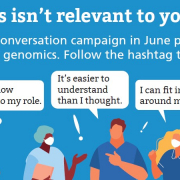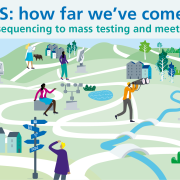Genomics Master’s series: midwifery and genomics
Elizabeth Quinlan-Jones, one of our funded students on the Master’s in Genomic Medicine, tells of her experience studying the course part-time
I have worked as a midwife at Birmingham Women’s Hospital for 12 years. I had always been interested in working in a profession allied to medicine and started my midwifery training in 1999. For the first three years of my career I worked in a variety of settings, including delivery suite, antenatal and postnatal wards, and in the community before moving into fetal medicine and research. This experience developed my interest in genetics as many of the complications in pregnancy that I observed frequently had a genetic association. Supporting families who are going through difficult pregnancies is something that I find very rewarding.
I am currently involved in a monthly fetal medicine and genetics clinic at the hospital where women see and receive an opinion from a Consultant in fetal medicine and a Consultant Geneticist relating to their pregnancy. The Consultant Geneticist informed me about the MSc. in Genomic Medicine and suggested that it may something be of interest to me. As I already had an interest in the field due to my work I decided to apply. I felt that the course would help me gain a better understanding of genetics and would enable me to develop my professional role.
A training need for midwives
Genetics in prenatal medicine is a rapidly growing area. At the time when I undertook my midwifery degree this type of training wasn’t part of the curriculum but I feel that it perfectly complements the genetic counselling I do as part of my job role now. It also gives me an extra layer of understanding to help me deliver more in depth information to families.
The support on this course has been excellent and the lecturers go above and beyond to assist students with their learning. There have been some fantastic module leaders and guest speakers which has really enhanced the experience. It’s also nice to be back in the learning environment, meeting with new people from very diverse backgrounds. This course has attracted genetic counsellors, medics, scientists, lab staff, nurses and recent biomedical science graduates. There’s a real mix of ages and experience so it great to study with people from such a variety of specialisms.
At the beginning of the course, the ‘Introduction to Genetics and Genomics’ module was a really helpful opportunity to revisit what I had previously learnt about in greater detail. I would highly recommend this module to other students studying either the PGCert or PGDip Genomic Medicine. I have completed six modules so far my favourite being the third module, ‘Genetics of Rare and Inherited Diseases’ as it was the most relevant to me. Having an understanding of how genetic conditions develop is something that I will apply in my work and understanding inheritance patterns informs the treatment and support we can provide when families get a result.
Intense, but not insurmountable
The idea of studying postgraduate modules in genetics may seem somewhat daunting. Some people may feel concerned about the level of learning or may not view some of the modules included as being relevant to their job role. The need for this type of knowledge is no longer specialist and is becoming more mainstream – healthcare staff need to be upskilled to understand the benefits and implications of genomic medicine. I would definitely recommend completing the two day access course to prepare you for the steep learning curve. It doesn’t matter if you haven’t got a strong genetics or molecular biology background; the teaching staff are very supportive and can offer extra tutorials as needed.
Support may be another factor which could possibly discourage someone from applying, either financially or from their employer in terms of the time needed to attend lectures. I was fortunate enough to have my funding provided by Health Education England and I am also allowed study leave to attend lectures thanks to my employer, but without this support I know it would be a struggle. With that said, I know a couple of nurses who are also studying on the same programme who are managing their workload and study really well. More of an awareness of real life examples like this could make someone in a similar position realise that they could do the same. I would also encourage anyone who is thinking of applying to look into their funding options and also arrange a chat with their manager to see what they can do for them in terms of extra support.
There is no doubt that this is an incredibly intense course but if you are up for a challenge and prepared to go into it wholeheartedly then it’s most definitely worth it!
Elizabeth Quinlan-Jones is a midwife at Birmingham Women’s Hospital. She is happy to be contacted here.









